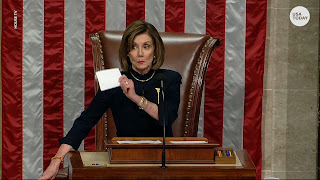Once again,
Andrew Sullivan tries to position himself as an eclectic thinker possessing a rare level of insight that both conventional liberals and conservatives lack. Sullivan tells us that the
expressed ideology of the 2016 Donald Trump campaign was compelling, while describing Trump's
personal behavior as abhorrent.
First, the campaign ideology:
... reflect for a second on the campaign of 2016. One Republican candidate channeled the actual grievances and anxieties of many Americans, while the others kept up their zombie politics and economics. One candidate was prepared to say that the Iraq War was a catastrophe, that mass immigration needed to be controlled, that globalized free trade was devastating communities and industries, that we needed serious investment in infrastructure, that Reaganomics was way out of date, and that half the country was stagnating and in crisis.
That was Trump. In many ways, he deserves credit for this wake-up call.
Sullivan, needless to say, likes every bit of this agenda, even -- especially? -- the racist bits.
And if [Trump] had built on this platform and crafted a presidential agenda that might have expanded its appeal and broadened its base, he would be basking in high popularity and be a shoo-in for reelection. If, in a resilient period of growth, his first agenda item had been a major infrastructure bill and he’d combined it with tax relief for the middle and working classes, he could have crafted a new conservative coalition that might have endured.
Yes, and I were a foot taller and 35 years younger, with better knees and a lifelong interest in spending hours honing skills the real me has never been interested in attaining, I'd be a superstar professional athlete right now.
Trump never cared about infrastructure -- he knew it was a good fit with his brand, although building the wall, once he'd been
reminded to mention it in speeches, turned out to be a better fit. ("I'm a builder," he
said in one interview when asked how he would manage to build the 1,900-mile wall he hasn't come close to constructing.) Trump probably couldn't tell you the first thing about Reaganomics, he opposed the Iraq War because he
doesn't like the Bush family, he said the country was stagnating and in crisis because he hated the then-president, and he grumbled about globalized free trade because he has a lifelong belief, probably learned from his father, that counterparties always screw you (a belief that's pure projection).
Maybe the people around him, particularly Steve Bannon and Roger Stone, intuited that this could be a winning agenda, but Trump didn't really understand it. Trump didn't have any interest in doing anything for ordinary citizens, so the only bits that really survived were the ones based on resentment -- the immigration crackdown and the trade wars.
But while Republican voters and a certain percentage of non-Republican whites responded enthusiastically to some of this, the key ingredient on this list that helped give Trump a victory after Mitt Romney and John McCain lost wasn't criticism of the Iraq War (which Trump rarely mentioned) or even infrastructure (ditto), it was the racist immigrant-bashing, along with the general bashing of the country that was an attack on Barack Obama and Obama's chosen successor, Hillary Clinton.
While Sullivan likes the stated agenda of 2016 Trump (as he selectively summarizes it), he doesn't approve of Trump's character.
... when you think of what might have been and reflect on what has happened, it is crystal clear that this impeachment is not about the Trump agenda or a more coherent version of it. It is about the character of one man: his decision to forgo any outreach, poison domestic politics, marinate it in deranged invective, betray his followers by enriching the plutocracy, destroy the dignity of the office of president, and turn his position into a means of self-enrichment. It’s about the personal abuse of public office: using the presidency’s powers to blackmail a foreign entity into interfering in a domestic election on his behalf, turning the Department of Justice into an instrument of personal vengeance and political defense, openly obstructing investigations into his own campaign, and treating the grave matter of impeachment as a “hoax” while barring any testimony from his own people.
But Trump won in 2016 largely
as a result of this set of character traits. Trump won
because he poisons domestic politics, marinates politics in deranged invective, and obsesses over personal vengeance. That's what his voters
like about him. They like the fact that Trump is unsocialized and angry. It delights them that when he talks about immigrants he not only says the quiet, racist part out loud, he seems to mean it, because he appears to despise immigrants as much as they do. He clearly loathes Obama and Hillary Clinton, as well as anyone who prevents him from doing whatever he wants to do.
Sullivan would like us to believe that Trump won based on a positive agenda to which Attention Must Be Paid, but also that Trump needs to be impeached because he's conducted himself in office in a reprehensible way. But his supporters backed him, and still back him, because of both of these things, and probably because of the pathology more than the agenda. Regardless of what Sullivan believes, there's no way to separate the two.







